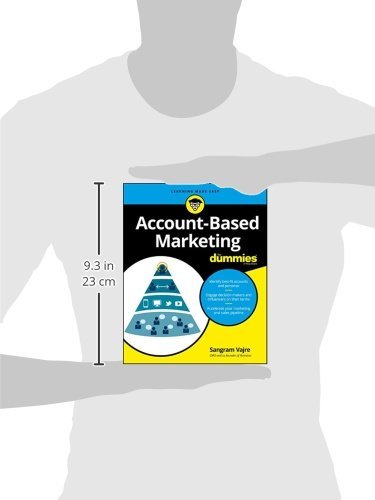I have been working on Account Based Marketing (ABM) for a few years now in B2B operation marketing, and I love the value that it brings to companies and to prospects. Instead of spending a lot of money to acquire new prospects that might not be qualified, now we spend money only on targeted accounts. The prospects’ online experience includes viewing only ads that matter for their business. ABM makes sense, from a scientific point of view. For the same campaign assets, would you rather (1) spend $1000 and be viewed by 2% of your top target (you basically wasted about $980 of budget), or (2) spend $1000 on 100% of your most valuable target prospect accounts. Scientifically speaking, option 2 will always bring a better return in your campaign performance.

I was talking ABM with a brilliant executive from another one of Atlanta’s startups last week. He was asking me, how does this ABM stuff work, and where should he start with his sales and marketing team if he tries to implement it in his company? First, Terminus has published a ABM book called ABM for Dummies , and—as far as I am concerned—they are the best in the game right now.
Here are the questions that you should ask yourself as you start your ABM journey:
Questions to your marketing team
1- Have you identified your market?
You would be surprised to know the number of businesses (B2B and B2C) that are still trying to sell their solutions to everybody in the market without a clear target. Not having a set market leads to a waste of resources and prevents the business from scaling exponentially. Every decision becomes a one-off and is an exception to the rule.
2- Have you created marketing personas?
In your best accounts, identifying your decision-makers, influencers, and gatekeepers can sometimes be systematized. If you approach the market pain points from an industry perspective, you will realize that most of the companies have a similar decision-making process. The problems you solve, most of the time, will be of equal levels of importance for similar-sized companies. Growing your accounts and having a targeted message to the right persona will help your sales team land more quality leads.
3- Do you have a way to automate your nurturing?
Using marketing automation will allow you to deliver a custom experience to your prospects. I have worked with Eloqua, Salesfusion, and Pardot in the past, but understanding why people use marketing automation is more important than the tool you are using. From scoring visits to sending trigger messages when someone interacts with your brand, these features will allow you to scale your prospects faster and give them what they want when they need it.
4- Can you measure your campaigns’ performance ALL THE WAY?
Digital marketing has allowed marketers to measure all touch-points in digital channels from the view-through to the buying process. All the micro-actions that someone takes that lead to the website matter in the buyer’s journey. Tracking those in a marketing dashboard will allow marketers to improve the conversion from one phase to the next, and you will help the entire company make decisions. In the past, marketers use to measure interest through dedicated focus groups. Now they can measure the customer thought process through digital interactions.
5- Do you reverse IP track?
Reverse IP tracking is a technology that is just like a reverse yellow page. When I was younger, and someone had a phone number but didn’t know the owner of the phone, they could search in the reverse yellow pages. It is the same with reverse IPs. Every visit to your website leaves a trace and is associated to the place where your visitor connects from. Some companies have specialized in identifying these locations and selling these IPs, they can tell you that company ABC connected to your website at this specific time. What is the value in this? If the sales team comes from a meeting with a prospect, and they realize the next day that they had a surge of connections from that specific company location, it means that the company they visited might be interested in what you are selling, and you see it even if they don’t reach out to you.
Questions to your sales team
A piece of advice for salespeople: don’t spend too much time on admin stuff. ABM will help you focus on the right sales activities. The challenge with all these questions is that you probably think that this will be a huge time suck, and you will end up in front of your computer a lot, but that is not the case.
6- Who are the 20 dream customers your business was created for?
By defining your dream customers, you already size the market. Most of salespeople know that if they get some type of company’s business, they will (1) remove an important pain point for this specific customer, and (2) help grow their company faster. Dream customers don’t necessarily have to be large customers; they are customers that understand and feel the pain point and can pay to fix it.
7- How do you balance your push and pull sales game?
Inbound leads (pull) are great because you basically wait for a hot prospect to land in your lap, and marketing should make that happen. Unfortunately, it is not the way sales convert into opportunities in B2B. Once the sales team sees that specific accounts have been engaging with your website, then it is time to reach out to the companies and cold call high-value persona (push) or use LinkedIn to reach out to first- or second-level contacts. Work your way through their organization, and see how your business value resonates with them. Daily, sales people spend time on pushing, pulling, re-engaging, and nurturing prospects. Understanding the ratio of what you do during the day will determine how much time you can allocate to different sales activities. An account executive will probably talk to fewer net new prospects (that are new in the prospect database), than inside sales, who might reach out to all the people who’ve exhibited an interest in the brand.
8- Do you have a way to log interactions with your prospects?
Knowing what is happening during the sales cycle will allow your marketing team to generate automated campaigns. Your prospects will then be able to consume a custom message that relates to their interest. Customizing messages doesn’t mean being super creepy and showing off the personal details you have but delivering valuable information that is useful for your audience. Marketing can only use what they know, and the more they know about the sales process, the current sales journey, the better they can serve your prospects while on autopilot. Sales also needs to know what messages are sent to their prospects from marketing.
Make sure that you keep track of prospects’ interactions with your team.
(Digital) Marketing is an enabler and should assist the sales team in increasing sales. Lead generation is apart of the general marketing activity on early stage prospects, but it can also be used in late stages to support the existing opportunities, by building nurturing, and taking part in the account penetration strategy as well.
There are many more questions that you need to ask your team, but these will help you start the process into ABM. It is a company-wide approach, and once it is implemented, it takes time to steer everybody in the same direction. It is possible, though, and the RoI on these activities is better than a “spray and pray” campaign to everybody.


